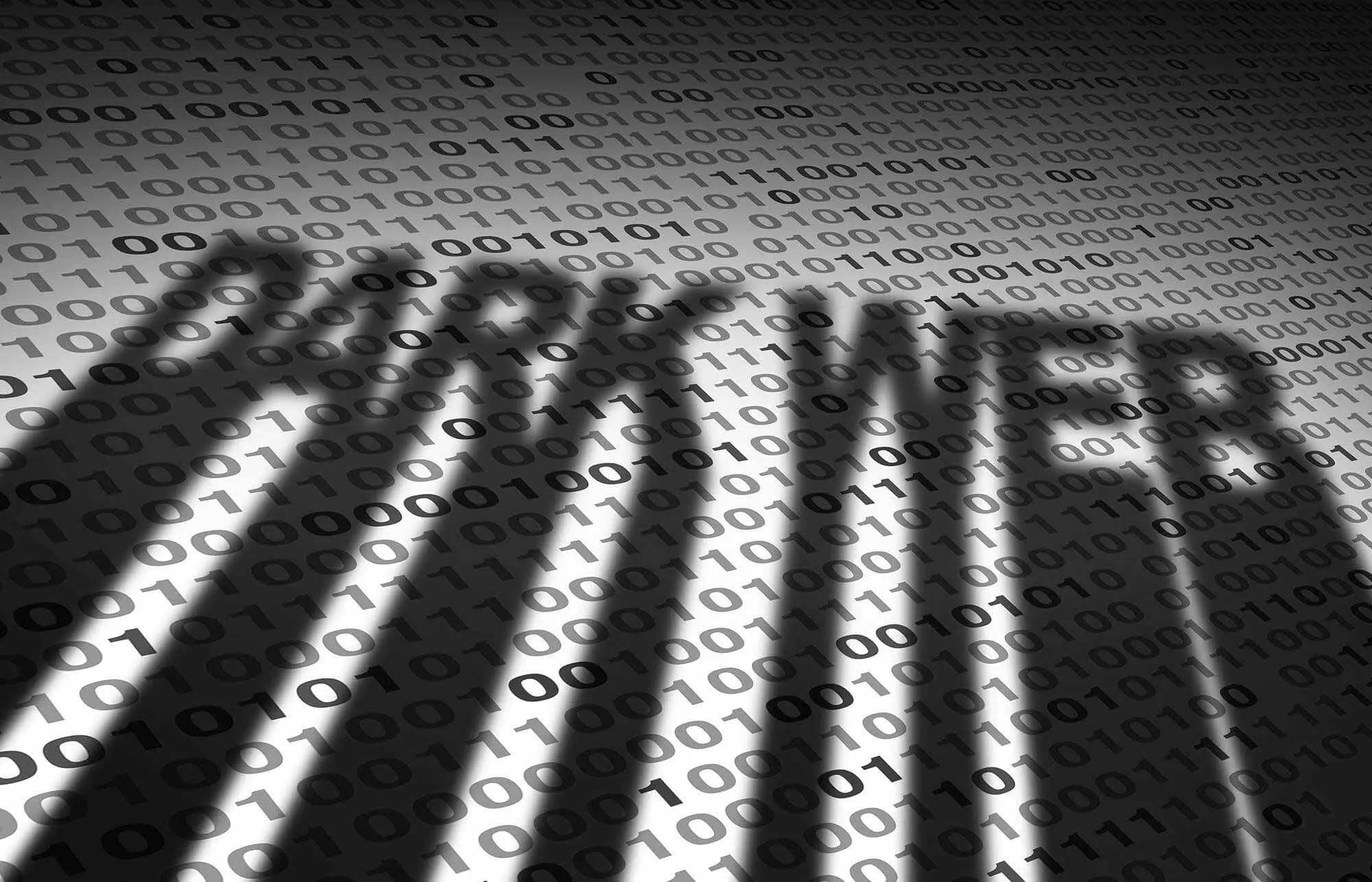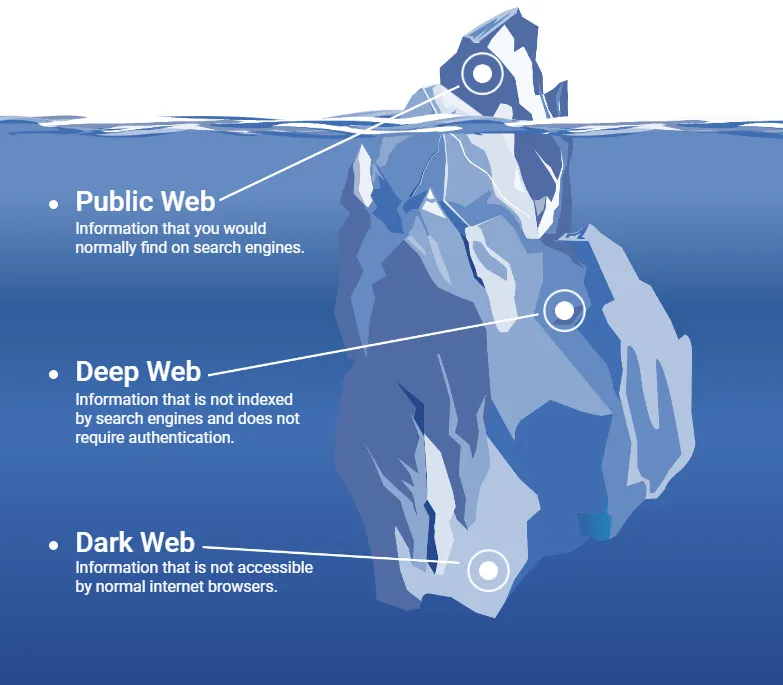What Is the Dark Web?

The dark web is a part of the internet that's difficult to access without special software—and can be difficult to navigate once you gain access. Multiple layers of encryption allow people to browse and post information on the dark web with near anonymity, making it a go-to platform for buying and selling illicit goods and services.
What Are the Three Levels of the Internet?
To better understand what the dark web is, it can be helpful to learn about the three levels of the internet.
Surface Web
The surface web or clear web is the public part of the internet that anyone can easily access with an internet browser and search engine. Search engines "crawl" the surface web for new websites and pages, and index their findings. When you search for a website or term, the search engine shows you results from its index that it thinks best match your query.
News and informational websites (including this blog), e-commerce sites, video-hosting platforms and many other types of websites are all part of the surface web. And while you may spend a lot of time on the surface web, it only makes up about 4% of the internet.
Deep Web
The deep web, also known as the invisible or hidden web, is the majority of the internet. You won't find these pages in search engine results, but you likely visit them every day. The deep web includes:
- Pages that require a login: Social media sites, streaming services, email and banking all have home pages that are in the surface web. However, once you log in to your account, you enter the deep web.
- Content that isn't indexed: A website, page or piece of content might be excluded from the list that search engines crawl and therefore won't show up in the search results. You can still access non-indexed pages if you know the URL or are linked there from another page.
- Secure storage: Much of the deep web is made up of photos, videos, research papers, medical records and other data that is stored online but only accessible with the proper credentials.
- Intranets: Businesses, schools and governments may maintain their own private networks that are built for the organization's use, but also connected to the internet. This intranet might provide a way for employees to communicate, store files or view informational pages regarding company policy.
The separation between the surface web and deep web is essential for how we use the internet. After all, you don't want your bank statements appearing in someone's search results. However, the deep web is still connected to the internet, which means a hacker could break through a company's security systems and access your personal information via what's known as a data breach.
Dark Web
The dark web is a small subsection of the deep web that's only accessible with special tools, software or authorization. Similar to the deep web, search engines don't index material that's on the dark web.
As with the other parts of the internet, the dark web doesn't refer to a specific site or page. Instead, it's a type of network called a darknet. If you set up a private and secure network with a group of friends, that could be an example of a darknet.

How Does the Dark Web Work?
The Tor network is one of the largest and most well-known darknets, and it's what most people are referring to when they discuss the dark web.
Tor—short for "The Onion Router"—bounces information through a series of encrypted layers (like an onion) that offers users more anonymity. There are onion sites and services on the Tor network, and page addresses end in .onion.
To access the dark web, you can download and install the free Tor browser. (You can also use it to browse the surface and deep web.) It's perfectly legal, and the U.S. government is a major funder for the Tor Project, which creates the browser.
But having access to the browser is only the first step. Unlike the surface web, there aren't great search engines for the dark web. You may need to find an onion site's address on your own, and the names aren't easy to remember. For example, the CIA's onion address is ciadotgov4sjwlzihbbgxnqg3xiyrg7so2r2o3lt5wz5ypk4sxyjstad.onion, and the nonprofit newsroom ProPublica's is propub3r6espa33w.onion.
These are two examples of legitimate organizations that have sites on the dark web. But the dark web is best known for the illegal activity that takes place there.
Why Is the Dark Web So Popular With Criminals?
The Tor network makes it easier to hide your identity and allows people to anonymously create and host onion services. As a result, criminals often use the dark web to buy and sell illicit goods and services.
Darknet marketplaces can be surprisingly similar to sites you find on the surface web—complete with limited-time sales, customer reviews and advertisements for organic products. However, criminals use these marketplaces to sell illegal products and services, including drugs, weapons and hacking software. Many identity thieves and hacking groups make money selling the information they steal on the dark web.
The value of the information can vary greatly depending on what's being sold. Full profiles, or fullz, may come with a name, Social Security number, date of birth and account numbers and could cost around $8 to $30 each. Complete medical records can be particularly valuable to identity thieves, and may go for up to $1,000. Cryptocurrencies, such as Bitcoin, are the preferred means of payments as these also help keep buyers and sellers anonymous.
How to Protect Yourself From the Dark Web
The dark web isn't intrinsically bad, illegal or dangerous. Whistleblowers, journalists, activists and law enforcement officers use the dark web to gather and share information without revealing their identity. And around the world, users may want to use Tor or the dark web to evade government censorship and surveillance.
However, if you're the victim of identity theft or affected by a data breach, your information could be sold on the dark web. There are some steps you can take to help protect yourself and stay ahead of identity thieves.
- Be cautious when browsing the dark web. If you choose to browse the dark web, be mindful that you don't know where a .onion address will take you. You could unwittingly wind up on a site that tries to install malware on your device.
- Use unique passwords for your accounts. If your account information is stolen, it's only dangerous if an identity thief can actually use it. Creating unique passwords for all your online accounts can help limit the impact of a single data breach. If you suspect your account information may have been compromised, change your password immediately.
- Update your passwords. Regularly changing your passwords even in the absence of a threat can also make your account information less useful. A password manager can help you create and store strong passwords, and may even perform regular security checkups for you.
- Sign up for dark web monitoring. A dark web monitoring service will look for your information on the dark web and inform you if it finds anything. The forewarning will let you know which information is compromised, and gives you a chance to take steps to secure your identity and accounts.
- Lock or freeze your credit reports. Locking or freezing your credit reports can keep someone from opening an account in your name, even if they have your personal information.
There are other ways to protect your information online as well, such as being mindful of what you share on social media, closing unused accounts and avoiding phishing attacks.
Get a Free Dark Web Scan
While there's no way to ensure all your information stays private, putting protective measures in place can help. Knowing if and when your information is compromised can also help you respond quickly—before too much damage is done. Experian offers a free, one-time dark web scan for your Social Security number, email and phone number. If you want ongoing dark web surveillance, it's one of the many benefits included with an Experian Premium membership.
Is your info on the dark web?
Internet criminals buy and sell personal data on the dark web to commit fraud. Could they have your info? Find out with a free Dark Web Scan.
Run a free scanAbout the author
Louis DeNicola is freelance personal finance and credit writer who works with Fortune 500 financial services firms, FinTech startups, and non-profits to teach people about money and credit. His clients include BlueVine, Discover, LendingTree, Money Management International, U.S News and Wirecutter.
Read more from Louis